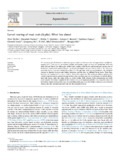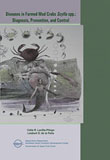Induction of molting in hatchery-reared mud crab Scylla serrata juveniles through temperature manipulation or autotomy
- Global styles
- MLA
- Vancouver
- Elsevier - Harvard
- APA
- Help

Date
2017Page views
14,504ASFA keyword
AGROVOC keyword
Taxonomic term
Metadata
Show full item record
Share
Abstract
The effects of water temperature and autotomy of chelipeds on growth, survival and molting of mud crab, Scylla serrata, juveniles were investigated under laboratory conditions in separate experiments. Hatchery-produced crabs at the intermolt stage with 2.0-2.3 cm carapace width and 1.7-2.2 g body weight were either exposed to temperature levels of 29, 32 and 35°C and ambient temperature of 24-31°C or subjected to autotomy (voluntary removal of one or two chelipeds). The crabs were allowed to molt twice prior to termination.
All crabs held at 35°C had 100% mortality due to incomplete molting during the first molt. The mean survival of crabs upon termination was 58, 64 and 50% for ambient temperature, 29 and 32°C, respectively. Specific growth rate (SGR) of crabs in the ambient (2.83 ± 0.12%) and 29°C (3.02 ± 0.15%) were comparable but significantly lower than (P<0.01) those at 32°C (3.85 ± 0.28%). The molt interval of crabs was significantly shorter in treatments with constant water temperature (29°C: 32 ± 0.80 days, 32°C: 28 ± 1.11 days) compared to ambient temperature (39 ± 0.93 days).
The survival of crabs with intact chelipeds (51.17 ± 3.56%) was comparable to those with one (50.55 ± 2.36%) or two (43.41 ± 1.59%) autotomized chelipeds. Juveniles with intact (5.80 ± 0.47%) or one autotomized cheliped (5.45 ± 0.30%) had a significantly higher SGR than crabs with both chelipeds autotomized (4.20 ± 0.52%) in the first molt. On the second molt, however, high SGR was observed in crabs with two chelipeds autotomized. The molt interval was significantly shorter in the autotomized crabs (one cheliped: 28 ± 1.66 days; two chelipeds: 23 ± 0.63 days) compared to those with intact chelipeds (36 ± 1.52 days). The results suggest that optimum water temperature for rearing S. serrata juveniles ranges from 29 to 32°C. Likewise, autotomy of one cheliped can promote molting without adversely affecting the growth and survival of the juveniles.
Description
Abstract only.
Suggested Citation
Huervana, J. J. D. C., Corre, V. L. Jr., & Quinitio, E. T. (2017). Induction of molting in hatchery-reared mud crab Scylla serrata juveniles through temperature manipulation or autotomy. In E. T. Quinitio, F. D. Parado-Estepa, & R. M. Coloso (Eds.), Philippines : In the forefront of the mud crab industry development : proceedings of the 1st National Mud Crab Congress, 16-18 November 2015, Iloilo City, Philippines (p. 145). Tigbauan, Iloilo, Philippines: Aquaculture Department, Southeast Asian Fisheries Development Center.
Type
Conference paperISBN
9789719931072Collections
Related items
Showing items related by title, author, creator and subject.
-
Larval rearing of mud crab (Scylla): What lies ahead
Waiho, Khor; Fazhan, Hanafiah; Quinitio, Emilia T. ; Baylon, Juliana C.; Fujaya, Yushinta; Azmie, Ghazali; Wu, Qingyang; Shi, Xi; Ikhwanuddin, Mhd; Ma, Hongyu (Elsevier, 2018)
The increasing global demand for mud crabs (genus Scylla) and threats to the wild populations highlight the urgency of fully rearing them in captivity. Despite considerable progress in mud crab production, most crab farms ...
; Baylon, Juliana C.; Fujaya, Yushinta; Azmie, Ghazali; Wu, Qingyang; Shi, Xi; Ikhwanuddin, Mhd; Ma, Hongyu (Elsevier, 2018)
The increasing global demand for mud crabs (genus Scylla) and threats to the wild populations highlight the urgency of fully rearing them in captivity. Despite considerable progress in mud crab production, most crab farms ... -
Diseases in farmed mud crabs Scylla spp.: Diagnosis, prevention, and control.
Lavilla-Pitogo, Celia R.; de la Peña, Leobert D. (Aquaculture Dept., Southeast Asian Fisheries Development Center, 2004-12)Aquaculture production has suffered many set-backs due to the occurrence of diseases. Many of the diseases are caused by infectious organisms that are difficult to detect and need sophisticated instruments for diagnosis, ... -
Mud crab pond and pen culture
Rodriguez, Eduard M. (University of the Philippines Aquaculture Society, Inc, 2001)





